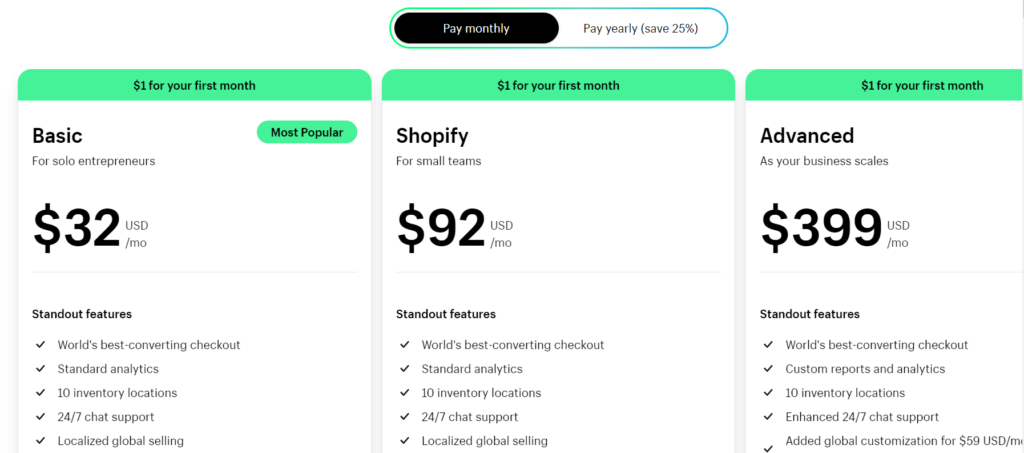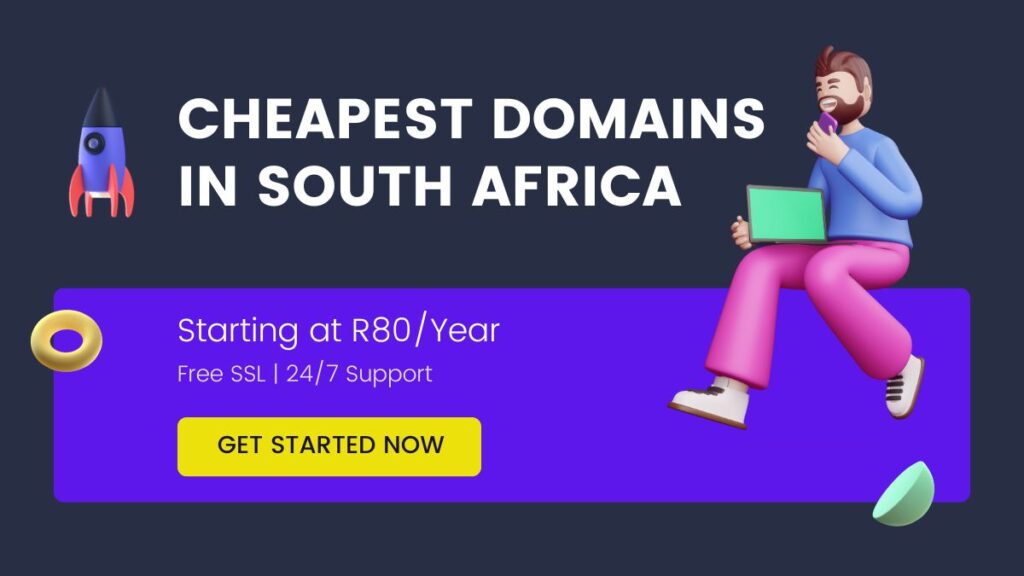Launching an online store in South Africa is exciting, but navigating the world of e-commerce platforms can feel overwhelming.
One crucial decision you’ll face is choosing the right pricing plan for Shopify, a leading platform.
So, let’s delve into Shopify pricing in South Africa, unpack the options, and help you find the sweet spot for your business!
Table of Contents
4 Key Shopify Plans in South Africa

Shopify offers four main plans, each catering to different business needs and budgets:
- Basic Shopify (R614/month): Ideal for budding entrepreneurs or those with a limited product range. It’s your gateway to the Shopify ecosystem, offering essential features like unlimited products, 2 staff accounts, and 24/7 support.
- Shopify (R1765/month): Geared towards growing businesses with a more extensive product catalog. This plan unlocks abandoned cart recovery, a powerful tool to win back potential customers, along with gift cards and professional reports to gain valuable insights.
- Advanced Shopify (R7656/month): Designed for high-volume businesses with a large product catalog. It boasts lower transaction fees, wholesale pricing for bulk purchases, and advanced reporting for in-depth data analysis.
- Shopify Plus (Custom pricing): Tailored for enterprise-level businesses with complex needs. This plan provides a dedicated account manager, custom integrations to seamlessly connect with your existing systems, and priority support for ultimate peace of mind.
The pricing above is if you pay monthly.

But it can be cheaper for yearly plans.
- Basic – R460
- Shopify – R1323
- Advanced – R5737
Factors to Consider Beyond Shopify Pricing in South Africa
While Shopify pricing in South Africa plays a vital role, consider these additional factors before making your decision:
- Your budget: Be realistic about your monthly expenses and choose a plan that aligns with your financial resources.
- Your business needs: Identify the features crucial for your operations, such as the number of staff accounts, storage space required, and marketing tools like abandoned cart recovery.
- Future growth: If you anticipate substantial expansion, opt for a plan that can accommodate your scaling needs. Remember, you can always upgrade later!
Keep in mind that Shopify pricing in South Africa doesn’t include transaction fees (2.4% + R0.30 for Basic Shopify and Shopify, 1.9% + R0.30 for Advanced Shopify).
For high-volume businesses, these fees can add up. Consider Shopify Payments, their integrated payment gateway, which offers competitive rates and can potentially save you money.
Remember, taxes are not included in the listed prices. Factor in VAT (Value Added Tax) when budgeting for your monthly expenses.
Top 5 Shopify Alternatives in South Africa
Shopify dominates the e-commerce platform scene, but it’s not the only game in town!
South African entrepreneurs have a wealth of alternatives when it comes to building their online empires.
So, before you commit to Shopify pricing in South Africa, let’s explore the top 5 contenders:

1. WooCommerce
This open-source, self-hosted platform reigns as Shopify’s main rival. It boasts:
- Flexibility: Tailor your store to your exact needs with thousands of free and paid plugins.
- Cost-effectiveness: No monthly fees – you only pay for hosting and optional premium plugins.
- Ownership: You truly own your store’s data and platform – no vendor lock-in!
2. OLITT
This African-born platform shines with:
- Affordability: Offers a free plan with basic features and a premium plan at R439 per year – super budget-friendly!
- Simplicity: Drag-and-drop interface makes building your store easy, even for beginners.
- Localization: Designed specifically for South African businesses, including integration with local payment gateways and shipping options.
3. BigCommerce
Ideal for medium to large businesses, it offers:
- Scalability: Handles high-volume traffic and large product catalogs seamlessly.
- Omnichannel capabilities: Integrates with physical stores and other sales channels.
- Marketing tools: Built-in features like SEO tools and email marketing support your growth.
4. Wix
Popular for its ease of use, it provides:
- Drag-and-drop website builder: Build your store intuitively, even without coding knowledge.
- Free plan: Start with a free plan to test the waters before committing.
- App Market: Expand your store’s functionality with various apps (some have fees).
5. Squarespace
Another user-friendly option, it features:
- Beautiful templates: Choose from stylish pre-designed templates for a polished look.
- Integrated features: Includes marketing tools, analytics, and SEO features.
- Free plan: Experiment with a free plan before venturing into paid options.
Remember, the “best” alternative depends on your unique needs and budget. Consider:
- Features: Do they offer the essential tools for your business (inventory management, marketing, etc.)?
- Technical knowledge: Are you comfortable with some technical aspects (like managing hosting with WooCommerce)?
- Growth potential: Can the platform scale with your anticipated business expansion?
- Pricing: Does it fit your budget, considering monthly fees, transaction fees, and any additional costs?

The Takeaway
Exploring Shopify pricing in South Africa and understanding your business needs are crucial steps towards selecting the perfect plan.
With its flexible options and robust features, Shopify empowers South African entrepreneurs to thrive in the e-commerce landscape.
So, dive into the options, carefully evaluate your requirements, and choose the plan that sets your online store on the path to success!
Read also:


